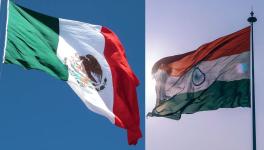Civil Society Organisations Concerned Over India's Decision to Join US-led Trade Agreement
Representational use only.Image Courtesy: Wikimedia Commons
A wide network of civil society organisations and social movements has written a letter to Piyush Goyal, Union Minister of Commerce and Industry, expressing its "deep concern at the Indian government's decision to join the United States of America (US) led agreement."
The signatories include All India Kisan Sabha (AIKS), All India Peoples Science Network, All India Drug Action Network, Bharatiya Kisan Union, India FDI Watch, Jan Swasthya Abhiyan, and Delhi Science Forum, among others.
The letter highlights that India's decision to join the Indo-Pacific Economic Framework (IPEF) for Prosperity has "happened without due consideration and parliamentary scrutiny regarding IPEF's implications" for the country's economic and development policy space.
The IPEF has been strategically presented by the US as a departure from traditional trade agreements. This is because it does not require market access commitments such as import duty cuts. Unfortunately, as per the letter, this strategy has led the Indian government to believe that the IPEF would solely focus on cooperation without any obligations to open up imports. However, the IPEF is more intrusive than conventional Free Trade Agreements (FTAs). It seeks to influence national policies and regulations across member countries, deeply penetrating India's regulatory policy space.
Consequently, the IPEF is likely to advance US interests not through direct market access channels but by instigating regulation and standards changes. These changes would indirectly facilitate market access in a subsequent stage.
"Further, there seems to be a belief among Indian trade officials that the IPEF will not be enforceable and is a “soft” agreement which can be negotiated and finalised quickly as it does not pose any legally binding commitments. From our analysis, the IPEF will include ‘high standard commitments that will be enforceable’, and India will have to comply with any commitments it makes."
Additionally, the organisations are concerned that IPEF's four pillars (Trade, Supply Chains, Clean Economy and Fair Economy) will impact various sectors, including fisheries, agriculture, manufacturing, and services, with its provisions.
Within the trade pillar of the IPEF, agriculture is a prominent area of focus. Although India is not required to implement direct tariff reductions, the IPEF will still demand commitments to facilitate agricultural trade based on "science-based decision making" and adopting "sound, transparent regulatory practices."
While these provisions may seem harmless, they will enable the US to establish a more favourable regulatory environment in IPEF countries, particularly concerning exporting genetically modified (GM) seeds and GM food. This situation threatens India's policy flexibility in restricting the import and sale of GM products. Any significant increase in imports of products such as GM corn and GM soybeans, which are major US exports, will severely impact the livelihoods of Indian farmers.
Furthermore, the IPEF's so-called "sustainable practices" may gradually introduce disciplines on subsidies within the agriculture sector. Several provisions within the agreement will affect regulations concerning seeds, pesticides, export restrictions, and investments in productive resources. These measures can potentially affect India's ability to regulate and manage its agricultural sector in a manner that supports its farmers and protects its domestic interests.
"Finally, despite the so-called stakeholder consultations, the IPEF remains a non-transparent and undemocratic trade agreement that is almost unilaterally designed and promoted by the most powerful economy in the world. The IPEF is nothing but a backdoor channel for the US to set global standards and regulations and secure the market interests of US-based Multinational Corporations (MNCs). It is neither in India’s economic interest nor consistent with India’s efforts to achieve the Sustainable Development Goals (SDGs) and protect its development policy space in the interests of its economy and its people."
The letter urged India not to "join the trade pillar citing geo-political considerations and without analysing the full implications of the agreement."
Get the latest reports & analysis with people's perspective on Protests, movements & deep analytical videos, discussions of the current affairs in your Telegram app. Subscribe to NewsClick's Telegram channel & get Real-Time updates on stories, as they get published on our website.
























